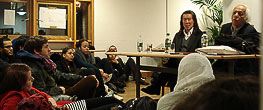Samir Amin: Combining world-class scholarship with social justice

With Samir Amin celebrating his 80th birthday this month, Ebrima Sall salutes Amin’s long-standing commitment to allying world-class scholarship with an unflinching commitment to social justice.
In February this year, CODESRIA published a book based on conversations that Demba Moussa Dembele, of the African Forum for Alternatives, had with Samir Amin. The book was titled ‘Samir Amin: Intellectuel organique au service de l’emancipation du Sud’ (‘Samir Amin: An Organic Intellectual Working for the Emancipation of the South’). The launching of the book in Dakar during the World Social Forum in February 2011 was used as an opportunity to celebrate Samir Amin, the man and the cause he has always stood for, and to do so in a forum that he has helped to build. The list of qualities of Samir that were highlighted in the dozen or so testimonies during that event is too long to be reproduced here. Those that I find particularly striking include the following:
- Professor Amin is a world-class intellectual, whose works include more than 40 books, many of which are, to this day, considered as classics in the field of development studies
- He is not only extremely productive, but also a fine thinker who also has the capacity to formulate very complex theories in easily accessible language. Samir said he reads Marx, all of Marx’s works, every 20 years. Reading Samir’s books, it becomes very clear that his own understanding of Marx is not superficial, but profound enough for him to transcend and creatively apply and, when and where necessary, extend ‘Marx’ to new contexts and situations
- From his book entitled ‘Accumulation on a World Scale’ to his analysis of the recent global financial crisis, the magnitude of which he had highlighted many months before the Bretton Woods Institutions began discussing it, and his analysis of the ‘Arab spring’, Samir has demonstrated that he has a profound understanding of how the global capitalist system works, and his ‘mission’ has been to uncover and expose the injustices of the global system that have an incredible capacity to metamorphose across time and space.
Professor Amin is also one of the rare breed of intellectuals who combine extremely fine scholarship with deep commitment to the cause of the underprivileged of this world: the countries of the South, and within the South, the labouring peoples of all genders, ages and colours. His scholarship had, in many respects, some kind of practical sense. In fact, although he keeps emphasising the importance of theoretical clarity, he never established a Berlin Wall between his scholarship and his personal engagement with social movements around the world. He has taught in many universities around the world, but he is also a founder member and leader of the World Forum for Alternatives. He has mentored generations of scholars, and inspired liberation movements around the world.
It was around him that the deans of social science and humanities faculties of African universities who formed the Council for the Development of Social Science Research in Africa, CODESRIA, met in Dakar in 1973 to establish CODESRIA. He also founded, shortly after CODESRIA was set up, what has now become another major international NGO: Environment and Development-Third World (ENDA-Third World), based in Dakar, at a time when few were the people who paid any attention to the environmental issues that have now become the subject of many world summits. Samir was then the director of the UN Institute for Development Planning (UN IDEP, based in Dakar), and he not only helped in creating these organisations that have now become so important, he also hosted them at IDEP, ‘at considerable professional risk to himself’, as Thandika Mkandawire rightly pointed out during the celebration of the 20th Anniversary of CODESRIA in 1993:
‘CODESRIA’s experience at IDEP was that CODESRIA, if it was to fulfill its mandate, could impose unbearable costs on the host institutes. Indeed only the courage and commitment of Samir Amin allowed CODESRIA to continue being hosted at IDEP at considerable professional risk to himself … CODESRIA [then"> had no sources of funds, no staff, no equipment, no legal status. It depended on a borrowed office and a typewriter from IDEP … Professor Samir Amin’s goodwill, commitment and resourcefulness, and Professor Bujra’s decision to take up the post of Executive Secretary at the risk of losing his job and the moral support of the Executive Committee set the stage for the institutionalization of CODESRIA.’[1]
He is still leading CODESRIA research projects, and just submitted a manuscript produced by a comparative research network on African Responses to the Crisis: Agrarian Reform and Agriculture in Africa, involving great scholars like Bernard Founou (Cameroon), Sam Moyo (Zimbabwe), Jacques Bertholet (France), Hassania Chalbi (Tunisia), Abdourahmane Ndiaye (Senegal), Issaka Bagayoko (Mali) and others.
As a person, I have always been amazed by the depth and breadth of Samir’s scholarship, but also by his simplicity. Lilly, his assistant at the Third World Forum, another organisation he founded, told the thousands of people who came to celebrate Samir’s life and achievements during the World Social Forum in Dakar that Samir and his partner Elizabeth taught her French and literally became her new family in Dakar. This is probably not the typical kind of employer–employee relations one sees in many institutions these days.
We wish Professor Samir Amin many happy returns!
BROUGHT TO YOU BY PAMBAZUKA NEWS
* Professor Ebrima Sall is director of CODESRIA, Dakar.
* Please send comments to editor[at]pambazuka[dot]org or comment online at Pambazuka News.
NOTE
[1] Report of the Executive Secretary to the 20th Anniversary of CODESRIA, 1993, p2.
